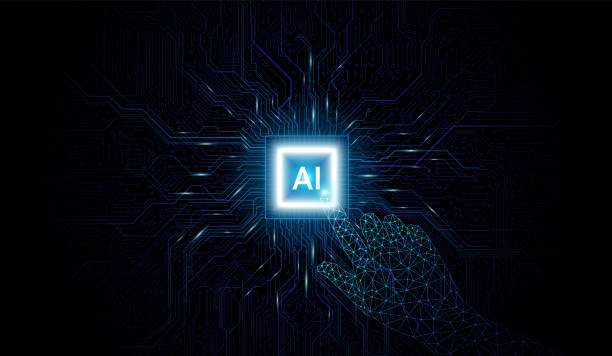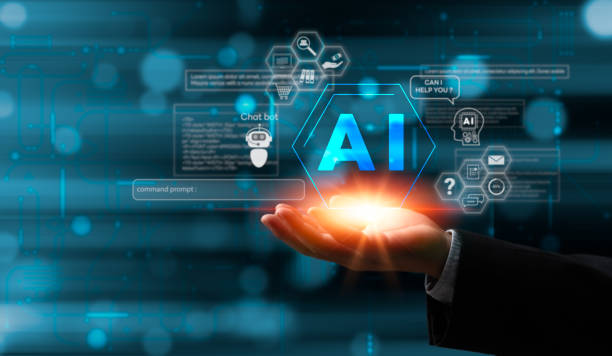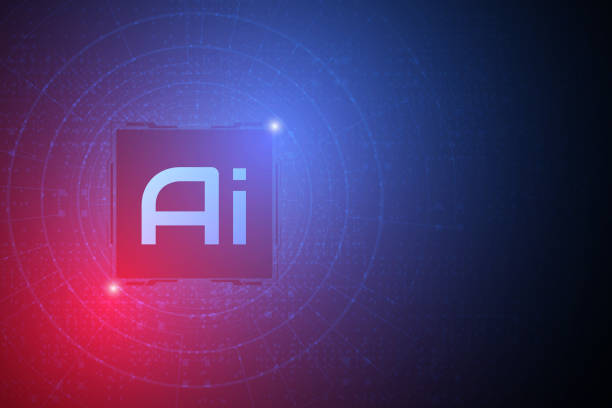What is Artificial Intelligence? Definitions and Key Concepts
![]()
#Artificial_Intelligence (Artificial Intelligence or AI), in short, refers to the ability of a computer system to mimic human cognitive functions such as learning, reasoning, problem-solving, and understanding natural language.
This broad field includes various approaches and techniques aimed at building machines that can perform tasks that typically require human intelligence.
Artificial intelligence is not just a technology, but a set of technologies that are increasingly changing the world around us.
Key concepts in artificial intelligence include the following:
- Machine Learning: Algorithms that allow computers to learn from data without being explicitly programmed.
- Neural Networks: Computational models inspired by the structure of the human brain.
- Natural Language Processing (NLP): The ability of computers to understand and produce human language.
- Computer Vision: The ability of computers to “see” and interpret images.
- Robotics: The design, construction, operation, and application of robots.
Artificial intelligence is no longer an abstract concept; rather, it is tangibly present in our daily lives.
From voice assistants on smartphones to movie and music recommendation systems, artificial intelligence is changing how we interact with the world.
In this article, we will delve deeper into the various dimensions of artificial intelligence and examine its applications, challenges, and future.
Does your current company website present a worthy image of your brand and attract new customers?
If not, turn this challenge into an opportunity with Rasawb’s professional corporate website design services.
✅ Dramatically improves your brand credibility and image.
✅ Paves the way for attracting leads and new customers.
⚡ Contact Rasawb now for free and expert advice!
Types of Artificial Intelligence from Narrow AI to General AI

Artificial intelligence can be divided into different types based on its capabilities and applications.
One of the most common divisions is the distinction between Narrow AI, General AI, and Super AI.
- Narrow AI This type of artificial intelligence, also known as weak artificial intelligence, is designed to perform a specific task.
Most of the AI systems we encounter today are of this type.
Examples of narrow AI include movie recommendation systems, facial recognition, and voice assistants such as Siri and Alexa.
These systems perform very well in their specialized task, but cannot operate outside their defined scope. - General AI The goal of this type of artificial intelligence is to create machines that can perform any task that a human is capable of, with the same level of efficiency.
General AI is still in the research stages, and no complete system has been created in this field so far.
Building artificial general intelligence comes with many technical and ethical challenges. - Super AI This type of artificial intelligence goes beyond human capabilities and can surpass human intelligence and creativity in all fields.
Super AI is a hypothetical concept and there is currently no example of it.
However, there is much debate about the potential dangers and opportunities of super AI.
Understanding the difference between these types of AI is essential to understanding the current advancements and limitations in this field.
Artificial intelligence plays an important role in many industries, while general and super AI are still on the research horizon.
Applications of Artificial Intelligence in Various Industries

Artificial intelligence is no longer limited to laboratories and is rapidly penetrating various industries.
From healthcare to manufacturing and transportation, artificial intelligence is transforming.
Below are some of the most important applications of artificial intelligence in various industries:
- Healthcare Diagnosis of diseases, drug development, personalization of treatments, surgical robots
- Manufacturing Automation of production lines, quality control, prediction of equipment failures
- Finance Fraud detection, risk management, automated financial advice
- Retail Product recommendations, inventory management, delivery robots
- Transportation Self-driving cars, route optimization, traffic management
- Education Personalized training, automatic grading of assignments, intelligent educational assistants
- Agriculture Product monitoring, irrigation optimization, pest detection
These are just a few examples of the widespread applications of artificial intelligence.
As technology advances, artificial intelligence is expected to play a more important role in our lives and create new opportunities for innovation and productivity improvement.
| Industry | Application |
|---|---|
| Healthcare | Diagnosis of diseases |
| Manufacturing | Automation of production lines |
| Finance | Fraud detection |
Machine Learning and its Role in the Development of Artificial Intelligence
![]()
#Machine_Learning is a subset of artificial intelligence that allows computers to learn from data without being explicitly programmed.
In fact, machine learning allows computers to identify patterns in data and make predictions and decisions based on them.
Machine learning plays a very important role in the development of artificial intelligence, as many advanced artificial intelligence systems are built on machine learning algorithms.
There are different types of machine learning algorithms, including the following:
- Supervised Learning In this type of learning, the algorithm is trained using labeled data.
This means that for each input, the desired output is specified.
Examples of supervised learning include image classification and regression. - Unsupervised Learning In this type of learning, the algorithm is trained using unlabeled data.
This means that there is no desired output for the inputs.
The goal in unsupervised learning is to find patterns and structures in the data.
Examples of unsupervised learning include clustering and dimensionality reduction. - Reinforcement Learning In this type of learning, an agent interacts in an environment and learns how to make the best decisions based on the feedback it receives.
Reinforcement learning is often used in robotics and games.
Machine learning is widely used in many artificial intelligence applications.
From facial recognition in smartphones to filtering spam emails, machine learning algorithms are improving the performance of artificial intelligence systems.
Artificial intelligence
Are you losing business opportunities because of an old website? With Rasawb, solve the problem of not attracting potential customers through your website forever!
✅ Attract more high-quality leads
✅ Increase brand credibility in the eyes of customers
⚡ Get free corporate website design consultation
Challenges Facing the Development of Artificial Intelligence

Despite significant advances in the field of artificial intelligence, there are still many challenges facing the development of this technology.
These challenges include technical, ethical, and social issues.
- Technical Issues Lack of training data, computational limitations, difficulty in interpreting results, uncertainty in predictions
- Ethical Issues Bias in algorithms, data privacy, accountability for AI decisions, security risks
- Social Issues Job loss, economic inequality, impact on social relationships, fear of AI
One of the most important ethical challenges in artificial intelligence is bias in algorithms.
If the training data used to train an algorithm contains bias, that algorithm will also be biased.
This bias can lead to discrimination in AI decision-making.
Another challenge that should be addressed is data privacy.
AI systems often need to collect and process large amounts of data.
This data can include users’ personal information.
Maintaining the privacy of this data and preventing its misuse is an important challenge.
Artificial intelligence
Ethics in Artificial Intelligence and the Need to Develop Laws

As artificial intelligence increasingly permeates our lives, the ethical issues associated with it become more important.
The decisions that AI systems make can have profound effects on people’s lives.
Therefore, it is essential to develop laws to ensure the responsible and ethical use of artificial intelligence.
Some of the most important ethical issues in artificial intelligence include:
- Transparency and Explainability AI decisions must be explainable and transparent so that responsibility can be determined in the event of a problem.
- Fairness and Equality AI systems should not be biased and should treat all people fairly and equally.
- Privacy People’s personal information must be protected and not used without their consent.
- Accountability It should be clear who is responsible for AI decisions.
- Security AI systems must be protected against cyberattacks.
Developing appropriate laws and regulations for artificial intelligence is a complex challenge, but it is essential to take action to ensure the safe and ethical use of this technology.
Artificial intelligence
The Future of Artificial Intelligence: Prospects and Possibilities

The future of artificial intelligence is full of exciting prospects and possibilities.
As technology advances, artificial intelligence is expected to play a more important role in our lives and create new opportunities for innovation and productivity improvement.
Below are some of the most important prospects of artificial intelligence in the future:
- Self-Driving Cars Self-driving cars can make transportation safer, more efficient, and more accessible.
- Healthcare Artificial intelligence can help diagnose diseases, develop drugs, and personalize treatments.
- Education Artificial intelligence can help personalize training and improve learning.
- Environment Artificial intelligence can help monitor the environment and manage natural resources.
- Space Artificial intelligence can help explore space and build space stations.
| Area | Prospect |
|---|---|
| Self-Driving Cars | Safer and more efficient transportation |
| Healthcare | Diagnosis of diseases and drug development |
| Education | Personalized training |
Of course, the development of artificial intelligence also comes with challenges.
For example, it must be ensured that artificial intelligence is used safely and ethically and does not cause job losses and economic inequality.
Artificial intelligence
Artificial Intelligence and Its Impact on the Labor Market

One of the main concerns about artificial intelligence is its impact on the labor market.
Some experts believe that artificial intelligence could cause many job losses, while others believe that artificial intelligence will create new job opportunities.
The reality is that the impact of artificial intelligence on the labor market is complex and depends on various factors.
Artificial intelligence will definitely automate some jobs.
Jobs that are repetitive, routine, and require low skills are more at risk of automation.
However, artificial intelligence can also create new job opportunities.
Jobs that require analytical, creative, and communication skills are likely to be in higher demand in the future.
Also, artificial intelligence needs specialists who can develop, implement, and maintain it.
Artificial intelligence
To prepare for the changes caused by artificial intelligence in the labor market, people should keep their skills up to date and learn new skills.
Governments and organizations should also provide training and support programs to help people adapt to these changes.
Artificial intelligence
Are your online sales not as expected? With Rasawb, solve the problem of low sales and poor user experience forever!
✅ Increase the conversion rate of visitors to customers
✅ Create a pleasant user experience and increase customer trust
⚡ Act now to get free advice!
Investing in Artificial Intelligence: Opportunities and Challenges

Artificial intelligence is an attractive investment area, but investing in this area comes with opportunities and challenges.
Opportunities include high growth potential, innovation, and impact on various industries.
Challenges include high risk, uncertainty, and the need for expertise.
To invest successfully in artificial intelligence, you need to do thorough research and choose companies that have strong teams, innovative technology, and sustainable business models.
Also, you should pay attention to the risks associated with investing in artificial intelligence and be prepared to lose capital.
Artificial intelligence
There are different types of companies in the field of artificial intelligence.
Some of these companies focus on developing artificial intelligence algorithms, while others focus on implementing artificial intelligence in various industries.
There are also companies that provide artificial intelligence consulting services.
Artificial intelligence
How to Learn Artificial Intelligence: Learning Resources and Paths

Learning artificial intelligence can be a challenge, but by using appropriate learning resources and paths, you can succeed in this field.
Artificial intelligence learning resources include books, online courses, training videos, scientific articles, and practical projects.
There are different artificial intelligence learning paths.
Some people prefer to start by learning basic concepts and then move on to more advanced topics.
Others prefer to start by doing practical projects and learning the required concepts while doing the project.
The best learning path for each person depends on their learning style and goals.
Artificial intelligence
Some of the key skills required for learning artificial intelligence include mathematics (linear algebra, calculus, statistics and probability), programming (Python, R), and machine learning.
Also, having knowledge in areas such as natural language processing, computer vision, and robotics can be helpful.
Artificial intelligence
Frequently Asked Questions
| Question | Answer |
|---|---|
| 1. What is Artificial Intelligence (AI)? | It is a branch of computer science that aims to create machines capable of simulating human intelligence and performing tasks that require human thinking, such as learning, problem-solving, and decision-making. |
| 2. What are the main types of artificial intelligence? | It can be classified into narrow AI, which focuses on a specific task, general AI, which has comprehensive human capabilities, and super AI, which surpasses human intelligence. |
| 3. Mention some common applications of artificial intelligence in our daily lives. | These include voice assistants (such as Siri and Alexa), recommendation systems (such as Netflix and Amazon), self-driving cars, facial recognition systems, and spam filters. |
| 4. What is the difference between Artificial Intelligence and Machine Learning? | Artificial intelligence is the broader concept of creating intelligent machines, while machine learning is a subset of artificial intelligence that focuses on enabling systems to learn from data without explicit programming. |
| 5. What is Deep Learning? | It is a subset of machine learning that uses multi-layered artificial neural networks (deep neural networks) to process data and discover complex patterns, and is used in image and speech recognition. |
| 6. What are the most prominent benefits of artificial intelligence? | Improving efficiency and productivity, automating repetitive tasks, making better decisions based on big data analysis, and developing solutions to complex problems in fields such as medicine and science. |
| 7. What are the main challenges facing the development and deployment of artificial intelligence? | These include the need for vast amounts of high-quality data, privacy and security issues, bias in data and algorithms, and high development and maintenance costs. |
| 8. Does artificial intelligence raise ethical or social concerns? | Yes, it raises concerns related to privacy, algorithmic bias, job loss due to automation, and responsibility for errors committed by intelligent systems, and the need for a regulatory framework. |
| 9. How can artificial intelligence affect the future of the labor market? | It can lead to the automation of some routine tasks, but it will also create new jobs that require advanced skills in developing, operating, and maintaining artificial intelligence systems. |
| 10. What are some modern or promising technologies in the field of artificial intelligence? | These include advanced natural language processing (NLP) (such as large language models like ChatGPT), computer vision, robotics, and generative AI. |
And other services of Rasa Web advertising agency in the field of advertising
Smart Social Media: Professional optimization to increase click-through rate using precise audience targeting.
Smart Linking: An exclusive service for growing digital branding based on optimizing key pages.
Smart UI/UX: A fast and efficient solution to attract customers with a focus on designing an attractive user interface.
Smart Data Analysis: An exclusive service to grow website visits based on smart data analysis.
Smart Linking: A combination of creativity and technology to attract customers through exclusive programming.
And more than hundreds of other services in the field of internet advertising, advertising consulting, and organizational solutions
Internet Advertising | Advertising Strategy | Advertorial
Resources
Let’s know the applications of artificial intelligence in the mechanized industry of Iran
,A narrative of an artificial intelligence investor in our lives
,What are the ethical challenges of artificial intelligence?
,What are the challenges related to artificial intelligence in different areas?
? Rasaweb Offering Digital Marketing Agency, specializing in providing comprehensive digital solutions for your business. From SEO and content marketing strategies to advanced e-commerce website design and targeted advertising campaigns, we transform your online presence.
📍 Tehran, Mirdamad Street, next to Central Bank, Southern Kazerun Alley, Ramin Alley No. 6



